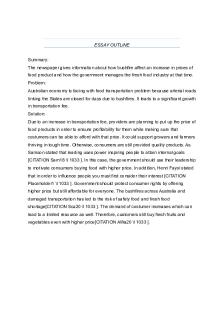Reverse outline for final essay pursuassive PDF

| Title | Reverse outline for final essay pursuassive |
|---|---|
| Author | Brandon Latusek |
| Course | English Composition II |
| Institution | Southern New Hampshire University |
| Pages | 3 |
| File Size | 52.5 KB |
| File Type | |
| Total Downloads | 23 |
| Total Views | 123 |
Summary
reverse outline for final persuassive essay...
Description
Religious exemption laws do more harm than good because members of the LGBTQ community are more likely to adopt and foster children, it keeps children out of loving homes and keeps them in the system, and it allows faith-based agencies to refuse service to children in the LGBTQ community. Members of the LGBTQ community are more likely to foster or adopt a child and in- particular, one from a racial or ethnical minority group. As of 2015 there were 427,910 children in foster care, of which 111,820 were waiting to be adopted, of the children waiting to be adopted 57% were children of color (Erney 2017). Research conducted in 2013 by UCLA’s Williams Institute of Law found that same-sex couples are four times more likely to adopt a child, and six times more likely to be fostering a child verses their different-sex counterparts, 39% of couples in the LGBTQ community who have children under 18 are non-white verses 36% in different-sex couples (Gates 2013). Biologically, same-sex couples cannot conceive a child on their own, there is only a few options available to them to have a child that is biologically one of theirs. All these options tend to be expensive and can create a riff in the relationship when choosing who will provide the DNA for the child. Therefore, most turn towards fostering and adopting children. Fostering creates extra income from the state, it allows them to bond with a child, and often times leads to a full adoption of that child. Religious exemption laws keep children out of loving homes and keep them in the system. “Agencies could reject otherwise qualified unmarried couples, individuals who are single or divorced, people of a different faith than the agency, interfaith couples, families and individuals who do not belong to a religious practice or lesbian, gay, bisexual, transgender, queer (LBGTQ) or gender expansive individuals or couples” (Erney 2017). In most states, where the religious exemption law exists, there is typically not many foster care agencies in the immediate
area, this creates limited resources for those families wishing to foster or adopt. If the agency that services the area in which these individuals live is allowed to refuse service, that will often bring an end to the journey of finding a child to foster or adopt for those loving families. When families who are completely qualified to foster or adopt a child are turned away it keeps those children they were going to give a home to in the system. The foster care system, whether you look on the state, or privately-owned side, is already stretched thin and finding funds to house, feed, and clothe those children is not easy to come by. This creates unnecessary stress on an already stressed system. Children in the foster care system who identify as LGBTQ already face adverse odds in finding a home, yet multiple states give their privately owned agencies the right to refuse service to those children. Mississippi state code § 11-62-5 states, The state government shall not take any discriminatory action against a religious organization that advertises, provides or facilitates adoption or foster care, wholly or partially on the basis that such organization has provided or declined to provide any adoption or foster care service, or related service, based upon or in a manner consistent with a sincerely held religious belief or moral conviction described in Section 11-62-3. This law states that the state government will not take any action against an agency who denies service based on their held religious beliefs or moral convictions. In a 2020 article published by the New York Institute of Law Adrianne Spoto writes, “Alternatively, the organization could decline to provide affirming and respectful care for LGBTQ children, perhaps refusing to respect a transgender child’s pronouns or knowingly placing LGBTQ children in homophobic or transphobic households where they will face pressure and rejection” (Spoto 2020). Most religions do not believe in same-sex marriage, or the fact that there are more than 2 genders.
They believe that a man should be with a woman, and the gender that you are born with is your gender no exceptions. This allows them to refuse even taking a child into their care if they identify as LGBTQ, or it allows them to place that child in a trans or homophobic home where they will be subject to rejection or even worse physical abuse without any ramifications....
Similar Free PDFs

Outline for Final Paper
- 1 Pages

Essay Outline and References Final
- 10 Pages

Final Essay for subject
- 4 Pages

0413 reverse engineering for beginners
- 225 Pages

Final Essay for English 1301
- 4 Pages

Essay Outline
- 2 Pages

Essay Outline
- 1 Pages

Essay outline
- 3 Pages

Essay Outline
- 2 Pages

Essay Outline
- 3 Pages

Reverse Engineering
- 989 Pages
Popular Institutions
- Tinajero National High School - Annex
- Politeknik Caltex Riau
- Yokohama City University
- SGT University
- University of Al-Qadisiyah
- Divine Word College of Vigan
- Techniek College Rotterdam
- Universidade de Santiago
- Universiti Teknologi MARA Cawangan Johor Kampus Pasir Gudang
- Poltekkes Kemenkes Yogyakarta
- Baguio City National High School
- Colegio san marcos
- preparatoria uno
- Centro de Bachillerato Tecnológico Industrial y de Servicios No. 107
- Dalian Maritime University
- Quang Trung Secondary School
- Colegio Tecnológico en Informática
- Corporación Regional de Educación Superior
- Grupo CEDVA
- Dar Al Uloom University
- Centro de Estudios Preuniversitarios de la Universidad Nacional de Ingeniería
- 上智大学
- Aakash International School, Nuna Majara
- San Felipe Neri Catholic School
- Kang Chiao International School - New Taipei City
- Misamis Occidental National High School
- Institución Educativa Escuela Normal Juan Ladrilleros
- Kolehiyo ng Pantukan
- Batanes State College
- Instituto Continental
- Sekolah Menengah Kejuruan Kesehatan Kaltara (Tarakan)
- Colegio de La Inmaculada Concepcion - Cebu




